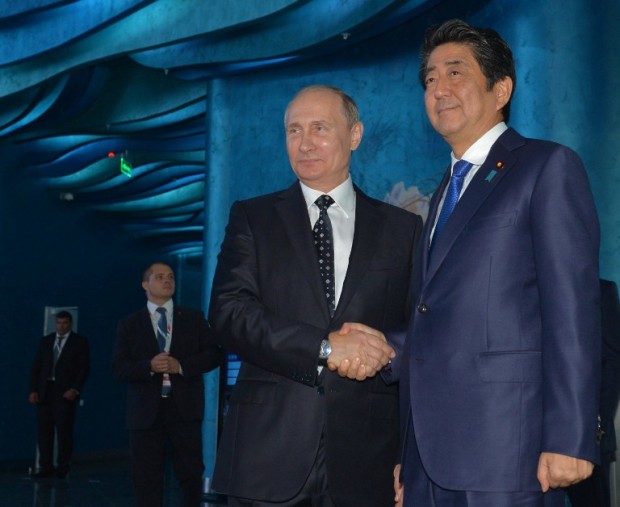
Russian President Vladimir Putin (C) shakes hands with Japanese Prime Minister Shinzo Abe as they visit an oceanarium on Russky Island near Vladivostok on September 3, 2016. AFP FILE PHOTO
Maneuvers between Japan and Russia over a potential World War II peace treaty are intensifying as Russian President Vladimir Putin’s December visit to Japan approaches. For his part, Putin on Thursday poured cold water on the Japanese government’s hopes to reach a deal quickly. “It’s impossible to set a time limit [for concluding a treaty]. That would be harmful,” he said. There appears to be a significant temperature difference in the two nations’ stances on the northern territories issue and economic cooperation.
Enticing with economic ties
The Japanese government sees Putin’s statement as “a tactical move intended to help Russia in the negotiations,” a senior Foreign Ministry official said. At a Friday press conference, Chief Cabinet Secretary Yoshihide Suga appeared unfazed by the comment. “Our intention is to continue with the negotiations tenaciously,” he said.
Still, Putin on Thursday also mentioned the border agreement Russia and China reached in 2004. “There was a deep, trusting relationship [with China]. We haven’t reached that place with Japan,” he said. This statement elicited some surprise from Japanese officials. “I didn’t think he’d go so far,” a source close to Abe said.
Abe and Putin have met 14 times — three times during Abe’s first stint as prime minister in 2006 and 2007, and 11 times since he took office again in 2012 — and are on a first-name basis. The government hopes the two will continue to build trust in meetings between them scheduled for November in Peru and December in Abe’s hometown in Yamaguchi Prefecture.
In addition to a direct line between the top leaders, the government’s strategy is to use the eight-item economic cooperation plan it proposed in May to entice Russia to move forward in the peace treaty negotiations. Hiroshige Seko, minister for economic cooperation with Russia, is scheduled to visit Russia in November to discuss the eight-item plan ahead of the summit meetings. The items primarily cover areas that could directly benefit Russian citizens, such as medical care and urban development. “We want to tell [the Russians] that good relations with Japan mean benefits to their own lives,” Seko has said.
Officials such as Foreign Minister Fumio Kishida and Shotaro Yachi, head of the secretariat of the National Security Council, who is known as Abe’s diplomatic brain, are scheduled to visit Russia soon to lay the groundwork for the summit meetings.
The government is not expected to insist that return of the four northern territories be part of a peace treaty. The idea is to prioritize the peace treaty, achieve the return of the Habomai group of islets and Shikotan Island, enable free travel to and from Etorofu and Kunashiri islands, and engage in joint economic activity there. Eventually, the government wants to see Etorofu and Kunashiri also returned to Japan.
Concerns
However, some Liberal Democratic Party (LDP) members are saying all four islands should be returned together. “There is too much stumbling forward” in the prime minister’s approach, one party member said.
The LDP is expected to change the term limits for party presidents from two contiguous three-year terms to three contiguous three-year terms. This could allow Abe to lead the party until September 2021, if he wins the next election in 2018, potentially making him the longest-serving prime minister in the nation’s history. “Since Abe’s long-held desire to revise the Constitution is not expected to happen soon, he’s probably looking for a political success by resolving the dispute over the northern territories,” a government source said.
If the December summit meeting with Putin is successful, some in the ruling parties expect Abe to dissolve the House of Representatives for a general election. Still, others in the LDP are wary of Abe’s approach. “If we frantically go after results, we’ll end up only getting economic cooperation with Russia,” a mid-ranking LDP member said./rga

